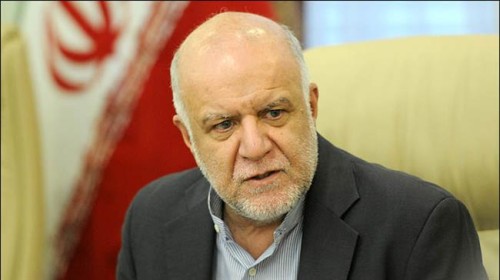PHOTO: Oil Minister Bijan Namdar Zanganeh: Sales to France and Italy imminent
LATEST
Iran’s Oil Minister Bijan Namdar Zanganeh has declared that Tehran will soon be exporting 300,000 barrels of oil per day to Western Europe.
Iranian exports to Europe were cut off in 2012 amid US-led sanctions, leaving the Islamic Republic dependent on four Asian customers — China, Japan, South Korea, and India — while sales fell by up to 65%.
Last month’s confirmation of Iran’s nuclear deal with the 5+1 Powers (US, Britain, France, China, Russia, and Germany) has begun the lifting of sanctions, including on financial transactions and insurance on tankers carrying the Iranian oil.
Zanganeh pointed to the contract, arranged earlier this month during President Rouhani’s visit to France, for the French oil giant Total to purchase 160,000 bpd. He said the deal will be signed on February 16.
The Oil Minister also proclaimed the benefit of foreign investment in Iran’s oil and gas sector, effectively suspended since 2010:
Total has indicated its readiness to take part in the development of South Azadegan oil field and Iran LNG [liquefied natural gas] project.
This means that we have not reached an agreement to put them in charge of the project, but the agreement is for Total to carry out necessary studies on these projects.
Zanganeh said that officials of Italy’s Eni will soon be in Tehran to sign contracts to purchase oil, and that the company has declared an interest in development of one of the Iranian oil fields.
“In addition, Italy’s Saras refinery has demanded to buy between 60,000 to 70,000 barrels of Iran’s crude oil per day,” he said.
Challenges for Foreign Involvement in Production
Before the effect of the 2012 sanctions, Iran was exporting about 2.2 million bpd. Sales collapsed to below 800,000 bpd at one point. Despite an interim nuclear deal in November 2013, recovery was limited to about 1.4 million bpd.
Tehran’s long-term prospects have also been hindered by lack of technology to expand production. The Oil Ministry has been working for months on new Iran Petroleum Contracts to offer more attractive terms for foreign investment.
However, the Ministry has been criticized by Iranian hardliners for offering too much to the international companies to bring them back to the Islamic Republic.
“So far, no contract has been signed and even the text of this model of contracts has not been readied yet,” Zangeneh said on Saturday. “The drafting of the contracts is under way and we will negotiate with [foreign] companies after finalization.”
Conservative Party Leader Denounces Ex-President Rafsanjani
The battle over election disqualifications continues in Iran, with the head of a leading conservative party denouncing former President Hashemi Rafsanjani.
Mohammad Nabi Habibi, the head of the Motalefeh Party, asked Rafsanjani, “Where is your jurisdiction?” to challenge the Guardian Council’s ban on thousands of candidates for the February 26 vote for the Parliament and Assembly of Experts.
An ally of President Rouhani, Rafsanjani is seeking the chair of the Assembly, which chooses the Supreme Leader. Last week, he questioned the qualifications of the 12-member Council, which is appointed by the Leader and the judiciary.
Hardliners and some conservative factions are concerned that a centrist bloc around Rouhani and Rafsanjani, possibly allied with reformists, could gain influence in the elections.
See Iran Daily, Feb 6: Battle Continues Over Election Disqualifications
Nabi Habibi said an agreed bloc of conservative candidates would soon be posted for voters.
The Guardian Council initially blocked 60% of the more than 12,000 candidates for the 290-seat Parliament and 80% of the 800 hopefuls for the Assembly. On Friday, a Council spokesman said about a quarter of the banned Parliamentary candidates had been reinstated, but there was no indication of a change in the line on the Assembly.
Rafsanjani eased his position on Saturday after the Council’s announcement, saying, “If a given percent of candidates who were disqualified initially are given opportunity out of moderation and seeking to redeem their rights, people will come to vote with enthusiasm and will vote for their favorite candidate and will wait to see the name of their candidates comes out of the boxes.”
President Rouhani, who criticized last month’s Parliamentary bans as a process for a “one-party state”, also stepped back from criticism on Sunday. He called on Iranians to exercise their “great duty” and “responsibility” and vote on February 26.
He implicitly referred to his attempt to curb the Guardian Council’s power:
Of course, I have not remained silent wherever I saw a problem and I will pay the price personally. But it is very important that we should pay attention to the end and the result with tactfulness, patience, and forbearance and go to the ballot box unitedly.

